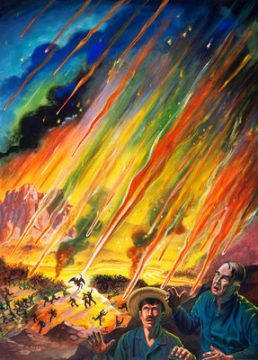Thursday: The Second Death
Certainly the greatest and most powerful manifestation of retributive judgment will be at the end of time, with the destruction of the wicked, called in the Bible “the second death” (Rev. 20:14). This death, of course, must not be confused with the death common to all the descendants of Adam. This is the death from which the Second Adam, Jesus Christ, will spare the righteous at the end of time (1 Cor. 15:26).
In contrast, the second death, like some of the other punishments seen in Old Testament times, is God’s direct punishment upon sinners who have not repented and received salvation in Jesus.
Read 2 Peter 3:5–7. What is the Word of God telling us about the fate of the lost?
“Fire comes down from God out of heaven. The earth is broken up. The weapons concealed in its depths are drawn forth. Devouring flames burst from every yawning chasm. The very rocks are on fire. The day has come that shall burn as an oven. The elements melt with fervent heat, the earth also, and the works that are therein are burned up. Malachi 4:1; 2 Peter 3:10. The earth’s surface seems one molten mass—a vast, seething lake of fire. It is the time of the judgment and perdition of ungodly men—‘the day of the Lord’s vengeance, and the year of recompenses for the controversy of Zion.’ Isaiah 34:8.” — Ellen G. White, The Great Controversy, pp. 672, 673.
Though sin can bring its own punishment, there surely are times that God Himself does directly punish sin and sinners, as Job’s protagonists argued. It’s true that all suffering in this world has arisen from sin. But it’s not true that all suffering is God’s punishing of sin. That was certainly not the case with Job, nor in most other cases as well. The fact is that we are involved in the great controversy, and we have an enemy who is out to do us harm. The good news is that, amid it all, we can know that God is there for us. Whatever the reasons for the trials we face, whatever the present outcomes of those trials, we have the assurance of God’s love, a love revealed as so great that Jesus went to the cross for us, an act that alone promises to end all suffering.
How can we be sure that someone’s suffering is direct punishment from God? If we can’t be sure, then what’s the best approach for us to take with that suffering person? Or even with our own suffering?


We can’t know for sure why anyone is suffering, but we do know that they are suffering. I feel it is our job to pray for that person and being careful, that we don’t judge them, or try to determine why they are suffering. Because God is the only judge of mankind.
The best approach would be compassion & mercy, because we do not know the reason why the person is suffering. With our own suffering, we should search our lives and see if there is anything we have done to offend God – it would be best to do this rather than leave it and suffer with the wicked in the end.
Sometimes we can see the cause-effect or a part of the chain of circumstances in someones life, but our human minds are pretty narrow to see the larger picture to make an absolute judgment to the extent to call a circumstance a punishment from God. With each judgment we make against another our own character is revealed.
For all those suffering in this trouble world all believers would still believe the Lord’s question for Adam and Eve in garden that where are you. This shows that lord’s love to us is greet {genesis 3:10} even though we fall into sin.
In order for every knee to bow, every tongue to confess, then every heart will be convicted for their part in this world’s sin. The righteous are no exception. How do we see that played out? Remember that 1jn 1:9 states when we confess we undergo a two part cleansing: he forgives, then cleanses us.
Many times if a person is going through or experiencing great challenges in their lives, we quickly judge them and even reach as far as saying the suffering is a result of what their parents or grandparents might have done. But only God has the answers ; leave the judging to him.
Where do we see God bringing punishment without giving entreaties and warnings first? It is the work of Satan to act contrary to the ways of God, bringing destruction without warning.
God isn’t in the business of punishing men before the work of judgment is complete. When God did act it was never without first giving warnings. He may allow some to reap what they have sown, but it is always for the purpose to save any who will be saved from sin, or to protect the righteous from evil men.